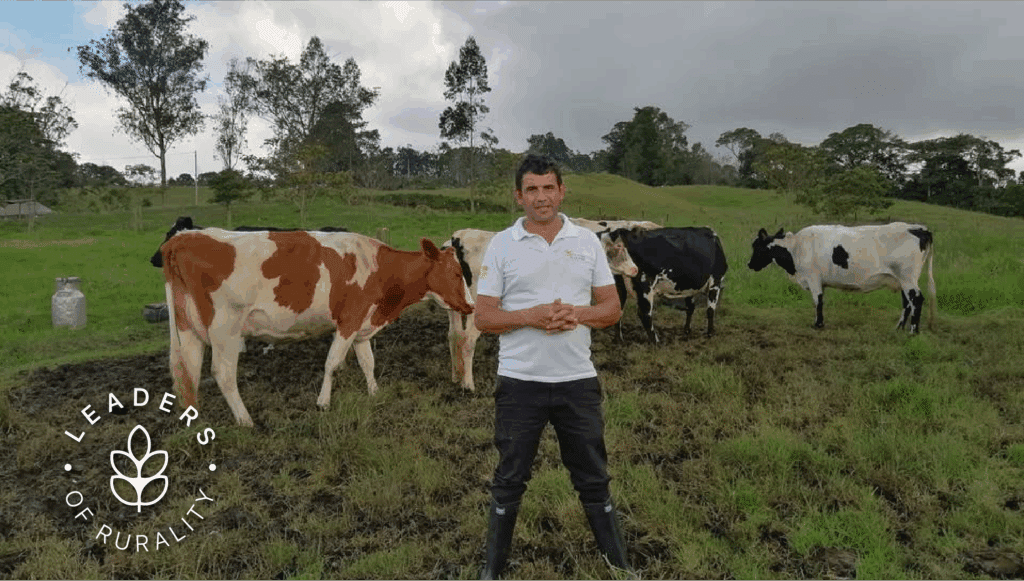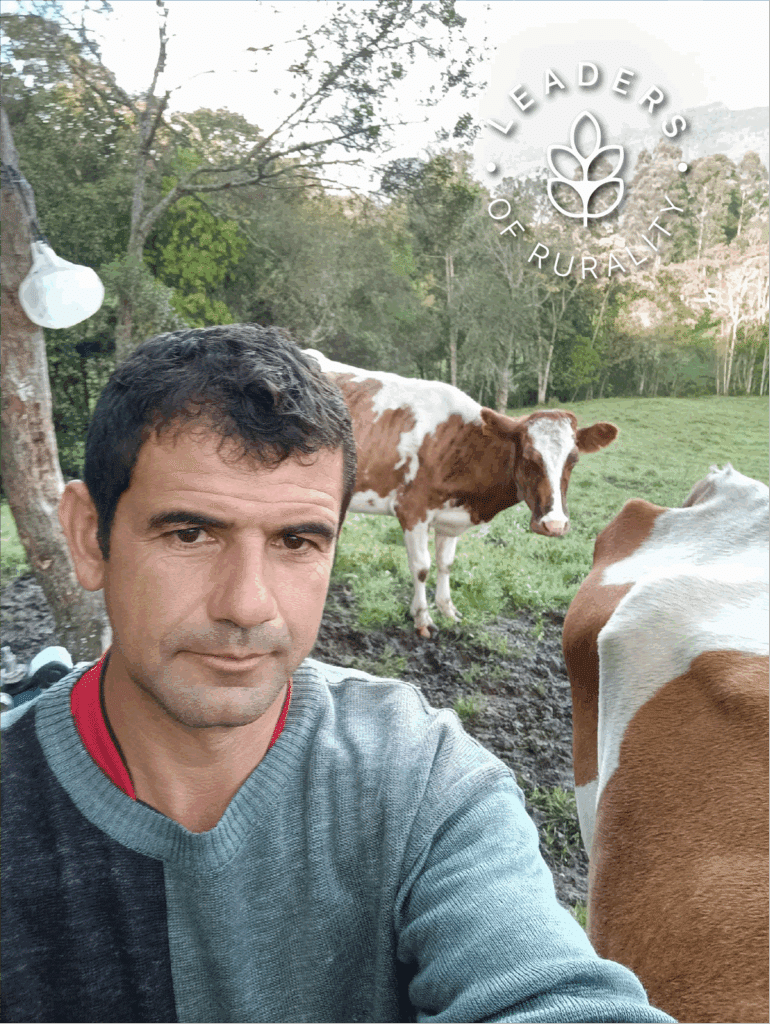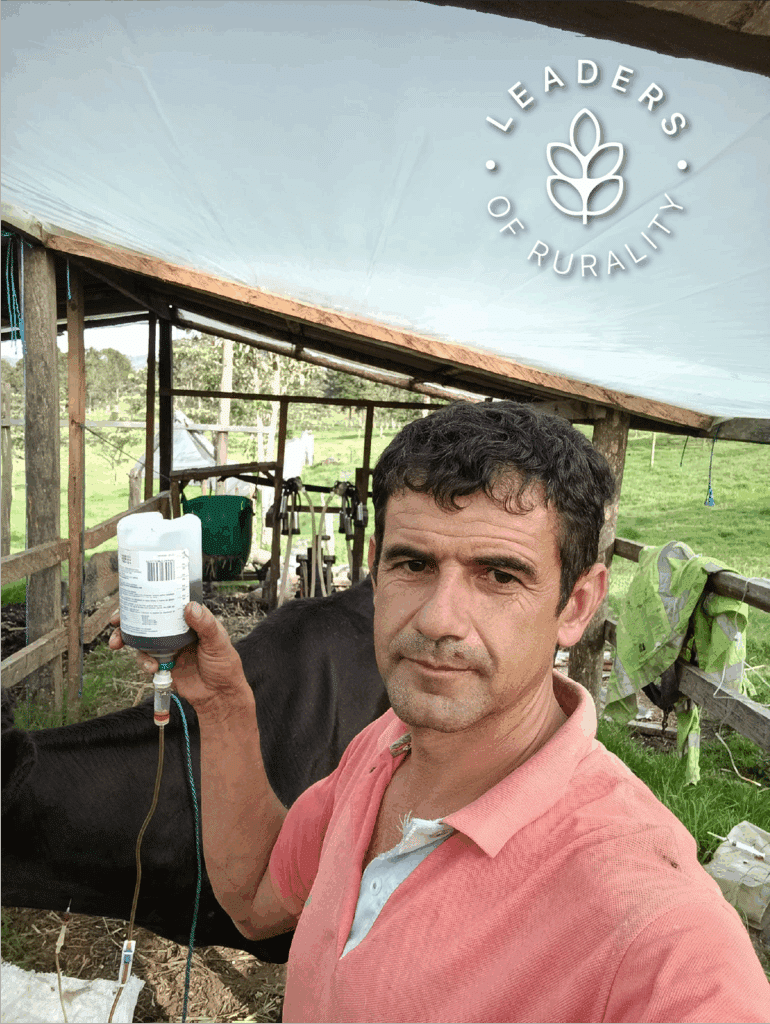
Fabio Andrés Ramírez, digital creator and proud representative of Pacho, Cundinamarca, in central Colombia, stands out for highlighting the realities of rural areas through digital content.
Pacho, Colombia, August 14, 2025 (IICA). Fabio Andrés Ramírez is a proud son of the Pacho area, “a town of oranges,” in the department of Cundinamarca, in central Colombia. A few years ago, he became a prominent creator of digital content and now has over 67,000 followers on Facebook, another 33,000 on TikTok, and about 53,000 on YouTube. He offers them interesting (and sometimes humorous) videos that show the everyday life of farmers, images of cattle fairs, photos of the land and the region’s lush landscapes, interviews with small-scale coffee growers or with fellow Colombians of all ages who smile at the camera on his mobile phone.
For this work as a producer and communicator, Ramírez was recognized as one of the Leaders of Rurality of the Americas by the Inter-American Institute for Cooperation on Agriculture (IICA) and will receive the Soul of Rurality award, created by the international organization specialized in agricultural and rural development to highlight those who leave their mark in support of food and nutritional security and sustainability in the region and the world.
“I’m a campesino, I love the countryside, I’ve worked all my life on the land and I’m currently working as a teacher,” says the producer, known by thousands in his country and abroad—but under a different name.
On his social media accounts, which can be found by searching for Fabio Enseña (or @fabioensena, with an “n” on TikTok and Facebook and with an “ñ” on YouTube), Ramírez opens the door to stunning Colombian landscapes, daily routines, and the much-anticipated gatherings of agricultural and livestock producers in Lenguazaque, Villagómez, Gachalá or Guayabal de Toledo, always in Cundinamarca.
His connection to the world of short videos and digital media began during the Covid-19 pandemic, when he made that kind of recording to develop lessons for his students and shared them from his farm via WhatsApp. He had also timidly started creating content for YouTube.
But his rise on social media took off in 2021, when the producer from Pacho turned a political situation (a national strike) into a viral video. Due to the work stoppage, the trucks that collect milk were not coming through the area. Ramírez saw the same happening elsewhere in the country and, although he supported the demands, he felt it was a shame to waste the production: he made curd, shared it with neighbors and protesters, made a video to document the moment, and posted it on TikTok. Within a few hours, the images had thousands of likes, and Fabio became a figure interviewed by major media outlets in Colombia.
“Sometimes you’d hear about people going viral with videos, and that was surprising. But I uploaded that TikTok and like ten minutes later it was full of hearts,” he told the Colombian magazine Semana at the time.
Since then, Fabio Enseña hasn’t stopped growing. Ramírez continues to teach at a technical agricultural institute in Cundinamarca, but his ambitions are now focused on social media, where all his videos are dedicated to promoting rural values.
“I’ve only known one thing: agriculture,” he said in the interview with the Colombian magazine. “Since I was little, I would play and my games were about having crops and raising animals. Later, in university, I did well because I was passionate about it.” That’s why now he can combine work and passion: “I talk about what I love, what I know, and what I live every day,” he summed up.

“I will continue teaching and producing content,” with the goal of “teaching both farmers and non-farmers” and “making people understand” what a rural life is like,” says Fabio Andrés Ramírez.
“Very serious” content
Though entertaining and warm, his videos are made with “very serious content about rural life,” says Fabio, who makes a point of noting the difference from other YouTubers and TikTokers who focus only “on telling jokes and doing pranks.” In his case, he continues, it’s “more about showing, about teaching what we do all the time” in the rural areas of Cundinamarca.
One of Fabio’s strengths is the livestock fairs, where he showcases cattle and horse exhibitions, food stands, and the residents and visitors who gather to celebrate rural life and do business.
“When I can, I go out and visit those fairs and make that kind of content that people really like.” And it shows, because they are the main source of “hearts” and “likes” on Fabio’s accounts—a collection of videos where people can learn about livestock production in the region and see dozens of people who recognize him and ask him to send messages to relatives and friends through his channels.
“I go to different towns and show what they grow there, what people live off of, what life is like,” confirms Fabio Enseña. “People really like that, it draws attention, because followers learn where these places are, what daily life is like for farmers and livestock producers,” he explains.
In fact, in his Cundinamarca-style version of “paint your village and you’ll paint the world,” Ramírez also manages to capture the attention of followers in urban areas, for whom country life—captured in colorful snippets through his videos—turns out to be a real discovery.

Fabio Andrés Ramírez, recognized by IICA as one of the Rurality Leaders of the Americas, will receive the Soul of Rurality Award for his impact on sustainability and food security.
Looking at the Moon
When asked about the new generations and the countryside (it’s refreshing to see many young people in the videos, participating in rural activities or greeting the YouTuber), Fabio admits that in Colombia, as elsewhere, many boys and girls “want to go to the cities to experience something different.” It is, he says, “very normal, but we also know many leave and, for some reason, come back because sometimes they can’t adapt or they don’t find what they were looking for in the city.”
Thanks to his work as a video chronicler, Ramírez knows that many young people return to the countryside because they “find the opportunities” they were looking for to “live well.” Today—he emphasizes—rural areas have “all the advantages,” from advances in health and education technologies “that make it possible for one to live well in the countryside too.” Even television, which was once a fantasy in these areas because there was no electricity, “today does reach them,” Fabio points out.
In the countryside, the content creator continues, “there are many good things you don’t have in the city, like peace and quiet” or “not spending so much money because often you can produce your own food or you don’t need to pay for transport.”
On that front, Fabio Enseña is making a valuable contribution. “Many people don’t know what the countryside is like, they imagine it’s a place where everyone is poor, where everyone lives badly, where people don’t shower,” Ramírez exaggerates. But when curious people “start to see the animals, the beautiful things, a sunrise, the possibility of living in nature, they begin to change.”
“Or sometimes they go visit a farm and discover how great it is not to hear noise at night, to be able to go out and look at the Moon in peace,” elements of a calm landscape that feels like “reaching a paradise” and that captivates the residents of big cities.
Asked about his future plans, Fabio doesn’t hesitate and lists the tools he wants to improve his technical capacity for video production, from microphones to a new camera, including a drone and cables. And he wants to keep growing on social media, “doubling, tripling the number of followers,” he says enthusiastically, because his channels are already watched in the United States, Mexico, Ecuador, Argentina, Chile, and Spain, among other countries.
“I’m going to keep teaching and producing content,” with the goal of “teaching both farmers and non-farmers,” and “helping people understand” what rural life is like.
More information:
Institutional Communication Division.
comunicacion.institucional@iica.int











